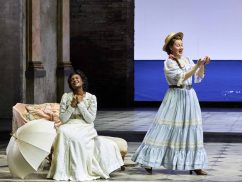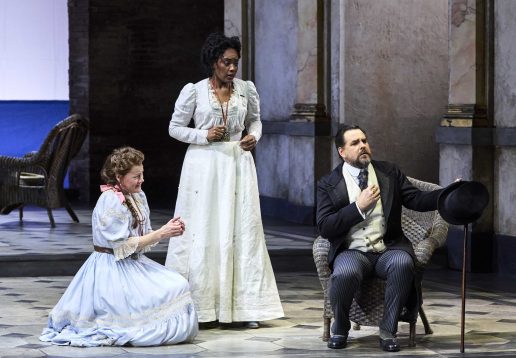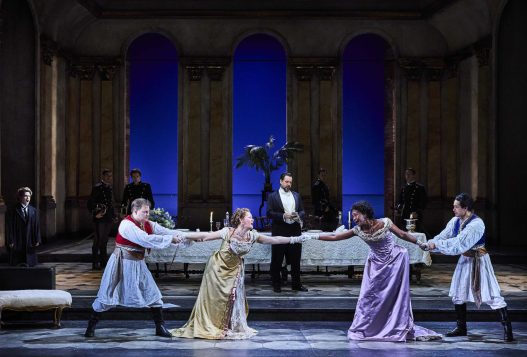Alexandra Oomens on her Full Circle Moment at the Sydney Opera House
 When Alexandra Oomens takes the stage this August at the Sydney Opera House, she will be returning not just as a performer, but as someone who has deep roots in this iconic venue. The London-based Australian soprano, known for her remarkable performances with some of the world’s most prestigious opera companies, is set to make her main stage debut with Opera Australia in the role of Despina in Mozart’s Così fan tutte. For Alexandra, this moment is both a professional triumph and a deeply personal journey, one that brings her back to where her love for opera first began.
When Alexandra Oomens takes the stage this August at the Sydney Opera House, she will be returning not just as a performer, but as someone who has deep roots in this iconic venue. The London-based Australian soprano, known for her remarkable performances with some of the world’s most prestigious opera companies, is set to make her main stage debut with Opera Australia in the role of Despina in Mozart’s Così fan tutte. For Alexandra, this moment is both a professional triumph and a deeply personal journey, one that brings her back to where her love for opera first began.
“It means so much to be on the stage of the Sydney Opera House,” Alexandra reflects with a sense of nostalgia and pride. “It is such a full circle experience—I attended operas, ballets, symphonic concerts, recitals, musicals, and plays here from an early age. I went to school at the Conservatorium of Music and would get the ferry past every morning and afternoon. I sang as part of the children’s chorus of La Bohème nearly 20 years ago, and performed on the concert hall stage with the Sydney Children’s Choir and Gondwana Choirs in various concerts throughout my childhood. And now that my career has brought me back to this beautiful house, I am immensely grateful to have the opportunity to sing on this iconic stage.”
Alexandra’s connection to the Sydney Opera House runs deep. Growing up in Sydney, she was surrounded by the arts, and the Opera House was a constant presence in her life. It was here that she first fell in love with the world of opera, and it was this love that led her to pursue a career in music. Her journey has taken her across the globe, performing with renowned companies and in prestigious venues, but returning to the Sydney Opera House feels like coming home.
A Fresh Perspective on a Timeless Role
In Sir David McVicar’s critically acclaimed production of Così fan tutte, Alexandra steps into the role of Despina, a character that offers a unique blend of comedy, wisdom, and social commentary. Set in the early 1900s, this production has been lauded for its depiction of the last summer of innocence before the cataclysmic events of the 20th century, and Despina’s role within this context is both intriguing and complex.
“The character of Despina in particular works brilliantly in this setting,” Alexandra explains, her passion for the role evident. “The way in which she communicates to the two young women is, in my eyes, ahead of her time. I feel a subtle pull toward the suffragette movement of the early 1900s in her desire for liberation and freedom as a woman. She comments that men are free to live and love for their own convenience, their own vanity, their own pleasure—yet women are shackled by tradition and expectation. She shows herself to be a powerful woman despite her position as a maid-come-governess to the younger ladies, full of ambition and a higher expectation for women in society.”
Despina, in Alexandra’s hands, is more than just a comedic figure; she is a woman of substance and depth, reflecting the changing social tides of her time. McVicar’s direction, combined with Alexandra’s nuanced interpretation, brings out the layers of Despina’s character, making her both relatable and relevant to contemporary audiences.
The Intersection of Comedy and Tragedy
Così fan tutte is often celebrated for its light-hearted, farcical elements, but it also delves into deeper themes of fidelity, heartbreak, and the loss of innocence. For Alexandra, balancing these contrasting tones is a challenge she embraces wholeheartedly.
“So much of the comedy for Despina is given to us in the score and libretto,” Alexandra notes, discussing her approach to the role. “Her candid, matter-of-fact conversation is laden with cheeky double entendre, and Da Ponte’s text coupled with Mozart’s recitative really shows the singer exactly how the comedic timing should fall. And while Despina invariably gets a few good laughs, we see a glimmer of a darker past and the shadow of her own experience shining through in both her arias. I find Despina to be a very ‘real’ woman—her demeanor and candor are relatable, and it is a pleasure to play such a modern and multidimensional woman alongside two other female characters that personify naivety and inexperience.”
Alexandra’s portrayal of Despina highlights the character’s complexity. She is not just a witty maid playing tricks on her employers; she is a woman with her own story, her own struggles, and her own views on love and life. Through her performance, Alexandra invites the audience to see beyond the humour and to understand the deeper, more poignant aspects of Despina’s character.
Collaborating with Zoe Zeniodi
This production of Così fan tutte also marks the debut of Greek conductor Zoe Zeniodi with Opera Australia, adding another layer of excitement and energy to the performance. Zeniodi, a semi-finalist in the La Maestra competition and a Fellow of the Hart Institute of Women Conductors, brings a fresh perspective to Mozart’s classic score.
“Working with Zoe has been fantastic,” Alexandra says, clearly enthusiastic about the collaboration. “She has brought so much energy to us all in the rehearsal room and has imbued the score with a fresh fizz that makes the ensembles in particular really zip along. Her vigor from the pit is palpable in each performance, and her warmth and support off stage has made this a particularly memorable experience.”
Zeniodi’s approach to conducting, combined with Alexandra’s interpretation of Despina, creates a dynamic and engaging performance. The chemistry between conductor and performer is evident, resulting in a production that is both musically and dramatically compelling.
The Power of Costume and Set Design
No operatic production is complete without the visual elements that bring the story to life, and in this regard, Moritz Junge’s lavish sets and costumes do not disappoint. Designed to evoke the grandeur of early 1900s Italian fashion, the costumes and set design play a crucial role in shaping the characters and the world they inhabit.
“The character of Despina is a little more subdued in costume than the other ladies,” Alexandra observes. “Her plain black dress in act one is sensible and suited to rushing around the stage, chasing after the two younger women. However, her evening dress is adorned with layers of lace and beaded panels, allowing an understated opulence to shine through towards the end of the opera. Given Despina’s place in the social hierarchy of the opera, her costumes are not as modern and spectacular as the other ladies. Gowns with corsets, bustles, and skirts that sweep the floor will invariably change your posture and the way you move about the stage, which helps to further develop how our characters inhabit the world Moritz Junge has created.”
These visual elements, combined with Alexandra’s performance, help to ground Despina in her time and place, while also highlighting her unique position within the opera’s social structure. The costumes, while not as grand as those of the other characters, still convey Despina’s inner strength and ambition, subtly reinforcing the themes of the production.
Connecting with the Audience
As Così fan tutte explores the intricacies of human relationships, Alexandra hopes that her portrayal of Despina will resonate with audiences on multiple levels. She sees Despina as a character who, despite the historical setting, speaks to modern sensibilities and challenges societal norms.
“Despina is a modern woman,” Alexandra concludes, her voice filled with conviction. “There is no flowery allusion in her conversation. She is frank and matter-of-fact about all things, especially when it comes to love, lust, and relationships. I have so enjoyed delving into her strength, her confidence, and her unapologetic attitude in this production. It is impossible not to be swept along with her ideas and her energy as a performer, and I hope that our audience will enjoy and relate to her character. It has been an absolute joy to play her and to inhabit her character in this beautiful production with Opera Australia.”
For Alexandra Oomens, playing Despina in Così fan tutte is more than just another role; it is an opportunity to bring her full range of talents to one of the world’s most iconic stages. It is a role that allows her to explore complex themes, engage with a beloved character, and connect with audiences on a profound level. And for those who watch her perform, it is clear that Alexandra’s journey, from a young girl attending performances at the Sydney Opera House to a celebrated soprano taking centre stage, is one that has come full circle in the most beautiful and meaningful way.
Photo Credit: Julie Ewing & Keith Saunders
To see Alexandra in Opera Australia’s Così fan tutte click HERE.


















